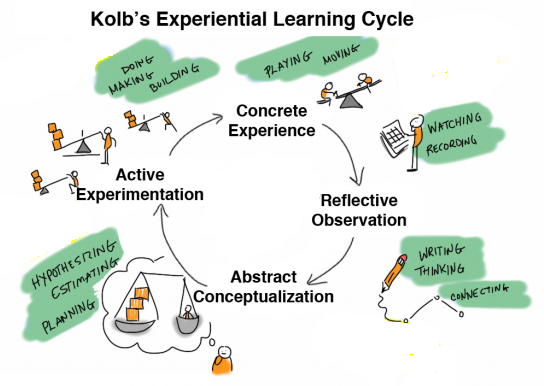Sometimes when we learn new things, we often struggle to find ways to obtain the latest knowledge, and that is because we haven’t found a learning method that best suits us. There are many different learning methods, such as direct instruction, inquiry-based, cooperative, open pedagogies, and experiential. The techniques displayed are just umbrella terms for other methods that fit within the umbrella. In other words, there are many different ways of learning. My personal favourite is the experiential approach.
The experiential approach came from Indigenous knowledge. The community has a deep connection with everything around them, such as spirits and the environment. It was a way to stay clear of social constructivism, identify your own truth, and not depend on others. As David Kolb likes to put it, “Experiential learning describes the ideal process of learning, invites you to understand yourself as a learner, and empowers you to take charge of your own learning and development.”(Institute for Experiential Learning, 2020) That not only does experiential learning have the capabilities to improve our education but also our own growth. For instance, when tripping over a wire. When you experience the fall, you now know to watch for the wire the next time you walk by.
Kolb also notes and understands that everyone has different personalities, lifestyles, disabilities, etc. In which he created a diagram to further our understanding.

Like any Science project, there is a hypothesis then the data, then the creation of a law or theory, that is typically what experiential learning is. It is important to note that experiential learning is essentially reflective learning that implements emotions in learning. Which exactly shows within the diagram. That our feelings help interpret how we see and learn.
” ‘reflective practice’ emphasizes the use of reflection in professional or other complex activities as a means of coping with situations that are ill-structured or unpredictable.” (Moon 2006) As stated above, the experiential approach helps us with situations we may not be familiar with, and that once we create experiences we can then reflect and discuss the meanings and purpose of our learning.
Here is a video for you to listen and experience to help grasp a better understanding of experiential learning.
Feel free to check out my Prompt 2 -Part 2, and learn how I use the experiential approach.
Resource:
Moon, Jennifer 2006 A Handbook of Reflective and Experiential Theory and Practice Reflective and Experiential Learning 235-247